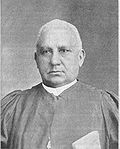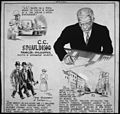The civil rights movement portal The civil rights movement was a social movement in the United States from 1954 to 1968 which aimed to abolish legalized racial segregation, discrimination, and disenfranchisement in the country, which most commonly affected African Americans. The movement had origins in the Reconstruction era in the late 19th century, and modern roots in the 1940s. After years of nonviolent protests and civil disobedience campaigns, the civil rights movement achieved many of its legislative goals in the 1960s, during which it secured new protections in federal law for the civil rights of all Americans. Following the American Civil War (1861–1865), the three Reconstruction Amendments to the U.S. Constitution abolished slavery and granted citizenship to all African Americans, the majority of whom had recently been enslaved in the southern states. During Reconstruction, African-American men in the South voted and held political office, but after 1877 they were increasingly deprived of civil rights under racist Jim Crow laws (which for example banned interracial marriage, introduced literacy tests for voters, and segregated schools) and were subjected to violence from white supremacists during the nadir of American race relations. African Americans who moved to the North in order to improve their prospects in the Great Migration also faced barriers in employment and housing. Legal racial discrimination was upheld by the Supreme Court in its 1896 decision in Plessy v. Ferguson, which established the doctrine of "separate but equal". The movement for civil rights, led by figures such as W. E. B. Du Bois and Booker T. Washington, achieved few gains until after World War II. In 1948, President Harry S. Truman issued an executive order abolishing discrimination in the armed forces. In 1954, the Supreme Court struck down state laws establishing racial segregation in public schools in Brown v. Board of Education. A mass movement for civil rights, led by Martin Luther King Jr. and others, began a campaign of nonviolent protests and civil disobedience including the Montgomery bus boycott in 1955–1956, "sit-ins" in Greensboro and Nashville in 1960, the Birmingham campaign in 1963, and a march from Selma to Montgomery in 1965. Press coverage of events such as the lynching of Emmett Till in 1955 and the use of fire hoses and dogs against protesters in Birmingham increased public support for the civil rights movement. In 1963, about 250,000 people participated in the March on Washington, after which President John F. Kennedy asked Congress to pass civil rights legislation. Kennedy's successor, Lyndon B. Johnson, overcame the opposition of southern politicians to pass three major laws: the Civil Rights Act of 1964, which prohibited discrimination based on race, color, religion, sex, or national origin in public accommodations, employment, and federally assisted programs; the Voting Rights Act of 1965, which outlawed discriminatory voting laws and authorized federal oversight of election law in areas with a history of voter suppression; and the Fair Housing Act of 1968, which banned housing discrimination. The Supreme Court made further pro–civil rights rulings in cases including Browder v. Gayle (1956) and Loving v. Virginia (1967), banning segregation in public transport and striking down laws against interracial marriage. (Full article...) Selected article - The women's poll tax repeal movement was a movement in the United States, predominantly led by women, that attempted to secure the abolition of poll taxes as a prerequisite for voting in the Southern states. The movement began shortly after the ratification in 1920 of the Nineteenth Amendment to the United States Constitution, which granted suffrage to women. Before obtaining the right to vote, women were not obliged to pay the tax, but shortly after the Nineteenth Amendment became law, Southern states began examining how poll tax statutes could be applied to women. For example, North and South Carolina exempted women from payment of the tax, while Georgia did not require women to pay it unless they registered to vote. In other Southern states, the tax was due cumulatively for each year someone had been eligible to vote. Payment of the tax was difficult for Black, Hispanic, and women voters, primarily because their incomes were much lower than those of white men. For married women, coverture prevented them from controlling their own assets. Recognizing that payment of the tax as a prerequisite to voting could lead to their disenfranchisement, women began organizing themselves in the 1920s to repeal the poll tax laws, but the movement did not gain much traction until the Great Depression in the 1930s. Both black and white women pressed at state and national levels for legislative action to abolish laws that required paying to vote. In addition, women filed a series of lawsuits to try to effect change. By the 1950s, the intersection of sexist and racist customs and law was apparent to those fighting the poll tax. This created collaborations between activists involved in the poll tax movement and those active in the broader civil rights movement. Louisiana abandoned its poll tax law in 1932, and the number of women voters increased by 77 percent. Women's activism helped bring about the repeal of poll tax legislation in Florida in 1937, in Georgia in 1945, in Tennessee in 1953, and in Arkansas in 1964. That year, the Twenty-fourth Amendment to the United States Constitution was passed, prohibiting poll taxes as a barrier to voting in federal elections. Passage of the Voting Rights Act of 1965 gave federal authority to the Department of Justice to institute lawsuits against the four states that still used poll tax to disenfranchise voters in state elections. The Supreme Court finally settled the four-decades-long struggle, abolishing the requirement to pay poll tax to be able to vote in any election, federal or state, in their ruling on Harper v. Virginia State Board of Elections in 1966. (Full article...) General imagesThe following are images from various civil rights movement-related articles on Wikipedia.
Related portalsWikiProjectsSelected biography -Whitney Moore Young Jr. (July 31, 1921 – March 11, 1971) was an American civil rights leader. Trained as a social worker, he spent most of his career working to end employment discrimination in the United States and turning the National Urban League from a relatively passive civil rights organization into one that aggressively worked for equitable access to socioeconomic opportunity for the historically disenfranchised. Young was influential in the United States federal government's War on Poverty in the 1960s. (Full article...) Selected image - Dr. Martin Luther King giving his "I Have a Dream" speech during the March on Washington for Jobs and Freedom in Washington, D.C., on 28 August 1963.
Did you know?
TopicsSubcategoriesThings to doAssociated WikimediaThe following Wikimedia Foundation sister projects provide more on this subject:
Discover Wikipedia using portals
|
(Redirected from Portal:Civil Rights Movement)

































































